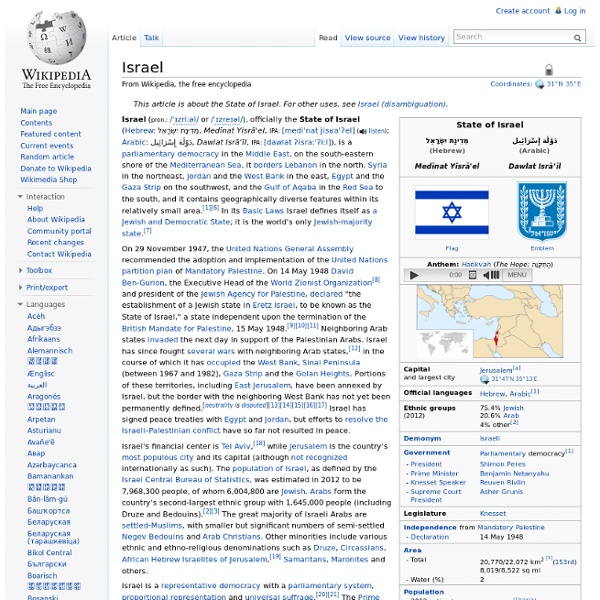



Israel: Maps, History, Geography, Government, Culture, Facts, Guide & Travel/Holidays/Cities Israel, slightly larger than Massachusetts, lies at the eastern end of the Mediterranean Sea. It is bordered by Egypt on the west, Syria and Jordan on the east, and Lebanon on the north. Its maritime plain is extremely fertile. The southern Negev region, which comprises almost half the total area, is largely a desert. The Jordan, the only important river, flows from the north through Lake Hule (Waters of Merom) and Lake Kinneret (also called Sea of Galilee or Sea of Tiberias), finally entering the Dead Sea 1,349 ft (411 m) below sea level—the world's lowest land elevation. Parliamentary democracy. Palestine, considered a holy land by Jews, Muslims, and Christians, and homeland of the modern state of Israel, was known as Canaan to the ancient Hebrews. A Hebrew kingdom established in 1000 B.C. was later split into the kingdoms of Judah and Israel; they were subsequently invaded by Assyrians, Babylonians, Egyptians, Persians, Romans, and Alexander the Great of Macedonia.
Country Guide: ISRAEL (washingtonpost.com) Israeli cuisine Israeli eggplant salad with mayonnaise Potato bourekas Israeli cuisine (Hebrew: המטבח הישראלי ha-mitbach ha-yisra’eli) comprises local dishes by people native to Israel and dishes brought to Israel by Jews from the Diaspora. Since before the establishment of the State of Israel in 1948, and particularly since the late 1970s, an Israeli Jewish fusion cuisine has developed.[1] Israeli cuisine has adopted, and continues to adapt, elements of various styles of Jewish cuisine and regional Arab cuisine, particularly the Mizrahi, Sephardic and Ashkenazi styles of cooking.[1] It incorporates many foods traditionally eaten in Middle Eastern and Mediterranean cuisines, and foods such as falafel, hummus, shakshouka, couscous, and za'atar are now widely popular in Israel.[2][3] History[edit] Origins[edit] Spiced cracked olives Israel’s culinary traditions comprise foods and cooking methods that span three thousand years of history. Old Yishuv[edit] Cooking class at a girls' school in Jerusalem, c.1936
Israeli Jewish Holidays » General Info » FAQs » Israeli Jewish Holidays Question: Which are the main Jewish holidays, and how do they effect tourists? Answer: National Israeli holidays / Chagim are generally all Jewish Holidays, plus the addition of Independece day. Shops and businesses are partially open during All Jewish Holidays, meaning - in Jerusalem they're all closed, and in Tel Aviv and Haifa they're usually open. Following is a brief explanation about every holiday, and a table of Jewish holiday dates for the coming years. Rosh Hashana - The beginning of the Jewish year, which is one of the three most sacred holidays in the Jewish religion. Yom Hakkipurim The day of amendment is the holiest day of the year, during which all Jewish people must fast for an entire day (25 hors). Sukkot and simchat Torah Sukkot is a very special holiday in which many Israelis set up special tents called "sukka" in their back yard, and invite all their friends and family to visit. Hanuka Tu Bishvat - Taanit Esther and Purim Passover
The State of Israel The State of Israel was formed on May 15 1948 as a Jewish state and a democratic republic. Over time it became one of the only two democracies in the Middle East, the other being Turkey. In the West – the Mediterranean Sea and the Gaza Strip; in the North – Lebanon and Syria; in the East – Jordan and the Palestinian Authority's autonomous territories; and in the South – Egypt and the Red Sea. Israel holds territories that it captured in 1967 from Syria (the Golan Heights), Jordan (the West Bank) and Egypt (Gaza). In certain sections of the West Bank, an autonomous Palestinian Authority was established. The state of Israel is republic, defined as a parliamentary democracy with proportional representation. Since the country's inception, no political party has achieved an absolute majority, thus making all of Israel's governments coalition governments. The Israeli president is chosen by the Knesset once every seven years. Israel is administratively divided into 6 districts and 14 provinces.